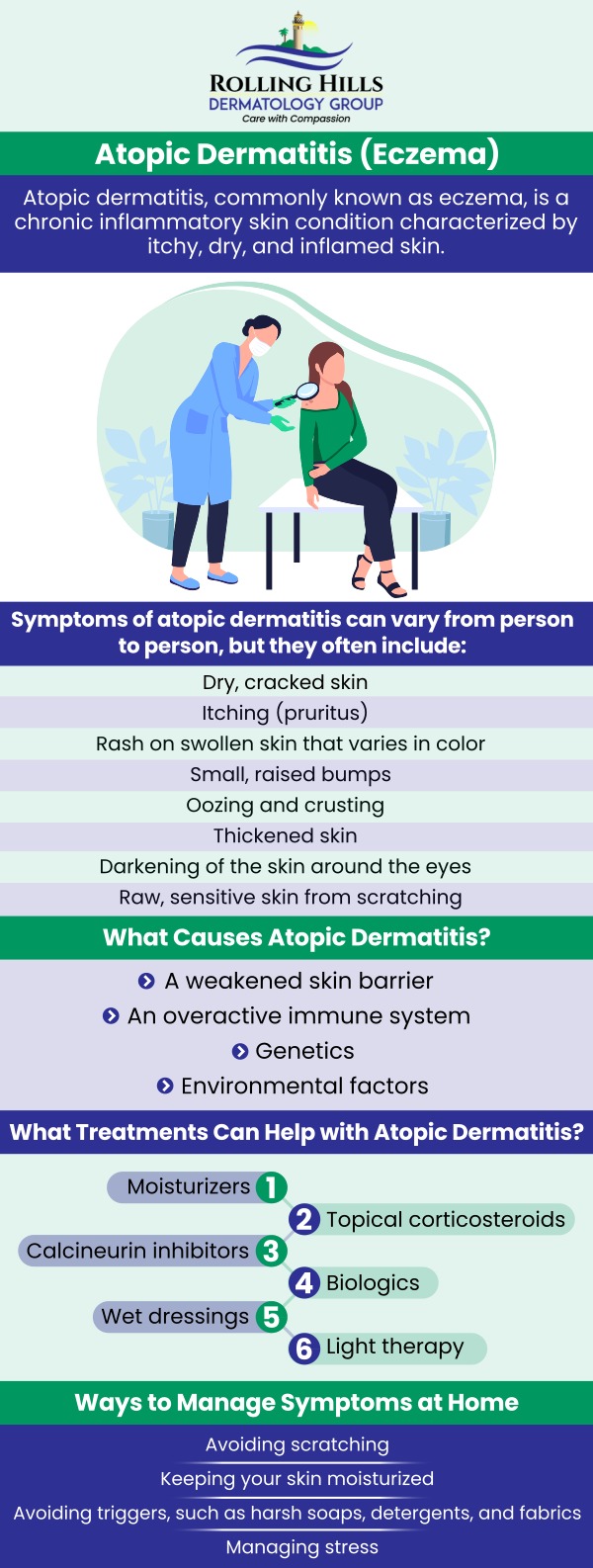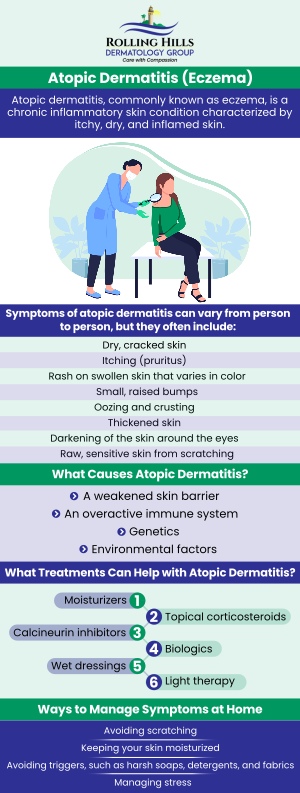Treatment of Atopic Dermatitis in Rolling Hills Estates, CA and Seal Beach, CA
Find relief from the discomfort of atopic dermatitis with our specialized treatments. At Rolling Hills Dermatology Group, our expert team provides comprehensive care to manage and alleviate the symptoms of atopic dermatitis. We offer tailored therapies to improve skin hydration, reduce irritation, and prevent flare-ups, giving you smoother, healthier skin. Contact us for a detailed consultation to explore the right treatment plan for your needs or book your appointment now. We have convenient locations in Rolling Hills Estate CA, and Seal Beach CA.




Table of Contents:
What are the most common treatments for atopic dermatitis?
How can I manage atopic dermatitis flare-ups?
Can atopic dermatitis be completely cured?
When should I see a doctor for atopic dermatitis treatment?
At Rolling Hills Dermatology Group, we understand the challenges faced by individuals living with atopic dermatitis, commonly known as eczema. This chronic skin condition is characterized by inflamed, itchy, and sometimes weepy skin, and it requires comprehensive management to minimize flare-ups and improve quality of life.
Our team of experienced dermatologists is dedicated to providing personalized care for patients with atopic dermatitis. A range of treatment options is available to alleviate symptoms of atopic dermatitis and prevent future flare-ups. Management typically begins with topical corticosteroids to reduce inflammation and itching. Depending on the severity of symptoms, over-the-counter hydrocortisone creams or stronger prescription corticosteroids may be recommended to effectively control flare-ups.
In addition to corticosteroids, maintaining skin hydration is crucial. Using high-quality moisturizers and emollients helps repair the skin barrier and reduces the frequency of flare-ups. Thick creams or ointments should be applied immediately after bathing to lock in moisture and enhance skin protection.
For individuals who do not respond adequately to topical treatments, calcineurin inhibitors such as tacrolimus or pimecrolimus may be an alternative. These medications are particularly useful for sensitive areas like the face and eyelids. Close monitoring ensures optimal results while minimizing potential side effects.
In more severe cases, systemic therapies may be considered. Oral antihistamines can help control itching and improve sleep quality, while systemic immunosuppressants or biological treatments may be used for persistent symptoms. These advanced therapies target specific immune pathways involved in inflammation and require careful monitoring to ensure safety and effectiveness.
Phototherapy, or light therapy, is another treatment option for individuals who do not respond to conventional topical treatments. Controlled exposure to natural sunlight or artificial ultraviolet light can help reduce inflammation and itching, providing relief for those with chronic symptoms.
Lifestyle modifications and trigger avoidance play a crucial role in managing atopic dermatitis. Identifying and avoiding irritants or allergens that can provoke flare-ups is essential. Additionally, maintaining a consistent skincare routine, wearing soft and breathable clothing, and managing stress levels can help control the condition and prevent exacerbations.
A comprehensive and individualized approach to atopic dermatitis ensures that each person receives a treatment plan tailored to their specific needs. Regular consultations with healthcare providers allow for ongoing adjustments to treatment strategies, providing long-term support for effective condition management. The goal is to achieve healthier skin and an improved quality of life through a well-rounded, patient-centered approach.
A cornerstone of managing atopic dermatitis is establishing a consistent skincare routine. At Rolling Hills Dermatology Group, we recommend using gentle, fragrance-free cleansers and moisturizers to keep your skin hydrated. Our dermatologists can guide you in selecting the right products that suit your skin type and help restore your skin barrier. We emphasize the importance of moisturizing immediately after bathing to lock in moisture and advise on the benefits of lukewarm baths or showers to prevent dryness and irritation.
Identifying and avoiding triggers is crucial in managing flare-ups. During your consultation, our team will work with you to pinpoint common irritants such as certain fabrics, harsh soaps, and environmental allergens like pollen or pet dander. We encourage keeping a diary to track flare-ups and identify your specific triggers. Additionally, our dermatologists can provide insights into stress-reduction techniques, such as mindfulness and meditation, which can play a significant role in controlling symptoms.
For flare-up management, we offer a variety of topical treatments. Our dermatologists can recommend over-the-counter options or prescribe stronger medications, tailored to the severity of your condition. We ensure that you have a clear and effective treatment plan, and we are always available to discuss any concerns or adjustments to your regimen. We also emphasize the importance of wearing soft, breathable clothing and avoiding scratching to prevent further irritation or infection.
At Rolling Hills Dermatology Group, our approach to managing atopic dermatitis is holistic and patient-centered. We invite you to consult with our expert dermatologists to receive personalized advice and treatment options designed to meet your individual needs and promote long-term skin health.
Atopic dermatitis is a chronic condition, meaning that while its symptoms can be managed effectively, there is currently no definitive cure. The severity and frequency of flare-ups vary from person to person, with some experiencing persistent symptoms while others may go through periods of remission. Factors such as genetics, immune system activity, and environmental triggers contribute to the condition’s development and progression, making it difficult to completely eliminate.
Although a permanent cure does not yet exist, many treatments can help control symptoms and improve the quality of life for individuals with atopic dermatitis. Topical corticosteroids, calcineurin inhibitors, moisturizers, and antihistamines can help reduce itching and inflammation, while systemic treatments and biologics are available for more severe cases. Phototherapy has also shown promise in managing symptoms for those who do not respond well to conventional treatments. In addition to medical therapies, identifying and avoiding triggers—such as allergens, irritants, and stress—plays a crucial role in preventing flare-ups.
With proper management, many people with atopic dermatitis can achieve long periods of symptom relief and maintain healthy skin. Advances in dermatological research continue to explore new treatment options, including targeted immunotherapies that address the underlying immune response. While a complete cure remains elusive, ongoing scientific developments provide hope for more effective long-term solutions in the future.
If you find that your symptoms are severe or worsening despite initial self-care efforts, it’s important to consult with our specialists. Intense itching, widespread skin involvement, or significant discomfort can disrupt your daily activities and may require prescription medications or specialized treatments that we offer at our practice. Additionally, if you notice that the affected areas become painful, swollen, or show signs of infection—such as oozing, crusting, or increased redness and warmth—it’s crucial to seek medical attention. Infections can exacerbate eczema, and our dermatologists can provide targeted therapies, including antibiotics if needed.
We also recognize that eczema can take a toll on your mental health and overall quality of life. Persistent symptoms can lead to emotional distress, social withdrawal, or sleep disturbances due to relentless itching. We work with you to develop a comprehensive treatment plan that addresses both the physical and emotional aspects of living with eczema.
If you’re uncertain about your diagnosis or suspect your symptoms might be related to another condition, our experienced dermatologists can provide a thorough evaluation. Accurate diagnosis is key to effective treatment, and we are equipped to differentiate eczema from other similar skin conditions.
For those who have been using over-the-counter treatments without significant improvement, we offer advanced therapies or biologic medications. These can be more effective for managing stubborn cases of eczema. Our goal is to optimize your treatment strategy and help you manage your condition more effectively.
At Rolling Hills Dermatology Group, we are committed to helping you achieve healthier skin and improve your quality of life. Don’t hesitate to reach out for a consultation if you’re experiencing challenges in managing atopic dermatitis. Your skin health is our priority. Contact us today or schedule an appointment online to start your journey to revitalized skin. We serve patients from Rolling Hills Estate CA, Torrance CA, West Carson CA, Lomita CA, Palos Verdes Estates CA, Hermosa Beach CA, Manhattan Beach CA, Redondo Beach CA, Seal Beach CA, Rossmoor CA, Garden Groce CA, Santon CA, Westminister CA, and surrounding areas.
Check Out Our 5 Star Reviews


Additional Services You May Need






